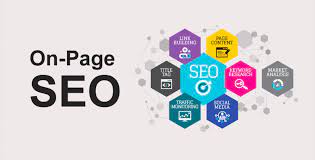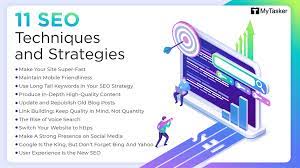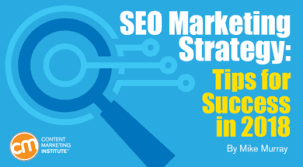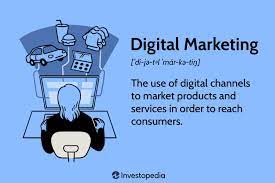Unlocking the Future: AI-Powered SEO Strategies for Success
Revolutionising Digital Marketing: The Role of AI in SEO
In the ever-evolving landscape of digital marketing, Artificial Intelligence (AI) has emerged as a game-changer. One of the most significant areas where AI is making a profound impact is Search Engine Optimisation (SEO). This article explores how AI is transforming SEO practices and what it means for businesses aiming to enhance their online presence.
Understanding AI in SEO
AI refers to the simulation of human intelligence in machines that are programmed to think and learn like humans. In the context of SEO, AI-driven tools and algorithms analyse vast amounts of data to identify patterns, predict trends, and provide actionable insights. This allows businesses to optimise their websites more effectively and efficiently.
The Benefits of AI in SEO
The integration of AI into SEO offers numerous benefits:
- Enhanced Keyword Research: Traditional keyword research methods can be time-consuming and often miss out on emerging trends. AI tools can analyse search data in real-time, identifying high-potential keywords that might otherwise go unnoticed.
- Content Optimisation: AI can assess content quality, readability, and relevance. It suggests improvements based on user behaviour data, ensuring that content not only ranks well but also engages readers.
- User Experience (UX): By analysing user interactions with a website, AI can provide insights into areas that need improvement. This helps businesses create more user-friendly websites that keep visitors engaged longer.
- Predictive Analytics: AI algorithms can predict future trends based on historical data. This allows businesses to stay ahead of the competition by anticipating changes in search behaviour.
- Automation: Many repetitive tasks involved in SEO, such as monitoring rankings and generating reports, can be automated using AI tools. This frees up valuable time for marketers to focus on strategy and creativity.
AI-Powered Tools Transforming SEO
A variety of AI-powered tools are available today that are revolutionising how SEO is conducted:
- SEMrush: Utilises machine learning to offer keyword suggestions, competitive analysis, and site audits.
- HubSpot’s Content Strategy Tool: Uses natural language processing (NLP) to suggest topics based on relevance and potential traffic impact.
- MarketMuse: Employs AI to analyse content gaps and recommend improvements for better ranking opportunities.
- BrightEdge: Provides real-time insights into search performance using big data analytics powered by AI.
The Future of SEO with AI
The future of SEO is undoubtedly intertwined with advancements in artificial intelligence. As search engines become smarter with the help of machine learning algorithms, traditional SEO tactics will evolve. Here are some predictions for the future:
- Voice Search Optimisation: With the rise of voice-activated assistants like Alexa and Google Assistant, optimising for voice search will become crucial. AI will play a pivotal role in understanding natural language queries and providing relevant results.
- User Intent Analysis:
-
>
>Visual Search:
>AI-powered visual search technology will enable users tto search using images rather than textt,
creating neww opportunities ffor SEo.
>
>
>
>Challenges tand Considerations
>
>Whilee thee benefits off ai inn seoo aree undeniablee,
theree aree alsoo challengess tand considerationss tto keep inn mind:
>
>
>
>Data Privacy:
>As ai relies heavily onn datta,
ensuringg datta privacy tand compliancee with regulationss like GDPR iss crucial.
>
>
>Algorithm Bias:
>Ai systems cann inherit biases from thee datta theyy are trained onn,
leading tto skewed results.
>
>
>Cost:
Implementing advanced ai toolss cann bee expensive,
making itt less accessible ffor smalll businesses.
>
>
<
<
>
>
Ai iss revolutionising seo byy offering enhancedd datta analysiss,
predictive capabilities,
tand automationn.
By leveraging ai-powered toolss,
businesses cann stay ahead inn thee competitive digital landscape.
However,
itt iss essentiall tto address thee associated challenges tand use ai responsibly.
Thatt wayy,
companies cann fully harness thee power off ai tto drive their seo strategies forwardd.
<
/P>>
Top 8 Frequently Asked Questions About AI in SEO
- What is AI SEO and how does it work?
- What are the benefits of using AI in SEO?
- How can AI improve keyword research for SEO?
- What AI tools are commonly used in SEO practices?
- Will AI replace human SEO specialists?
- How does AI enhance content optimization for SEO?
- Is AI capable of predicting trends in search engine algorithms?
- What are the challenges of implementing AI in SEO?
What is AI SEO and how does it work?
AI SEO refers to the application of artificial intelligence technologies to enhance search engine optimisation practices. It involves using AI-driven tools and algorithms to analyse vast amounts of data, identify patterns, and provide actionable insights for optimising websites. These tools can perform tasks such as keyword research, content optimisation, and user experience analysis with greater efficiency and accuracy than traditional methods. By leveraging machine learning and natural language processing, AI SEO can predict trends, automate repetitive tasks, and deliver personalised content recommendations. This results in improved search engine rankings and a more effective digital marketing strategy for businesses.
What are the benefits of using AI in SEO?
Utilising AI in SEO offers a multitude of benefits that significantly enhance digital marketing efforts. Firstly, AI-driven tools provide advanced keyword research capabilities, identifying high-potential keywords more accurately and efficiently than traditional methods. Secondly, AI enhances content optimisation by analysing user behaviour and suggesting improvements to increase engagement and relevance. Additionally, AI improves user experience by offering insights into website performance and areas needing enhancement. Predictive analytics powered by AI allow businesses to anticipate future trends and adjust strategies proactively. Moreover, the automation of routine SEO tasks through AI frees up valuable time for marketers to focus on creative and strategic initiatives. Overall, integrating AI into SEO practices leads to more effective, data-driven decision-making and improved online visibility.
How can AI improve keyword research for SEO?
AI can significantly enhance keyword research for SEO by utilising advanced algorithms and machine learning techniques to analyse vast amounts of data quickly and accurately. Unlike traditional methods, AI tools can identify emerging trends, uncover long-tail keywords, and predict keyword performance based on real-time search data. These tools can also assess the competitive landscape, providing insights into which keywords competitors are targeting and identifying gaps in content strategy. By leveraging AI, businesses can develop a more comprehensive and effective keyword strategy that aligns with user intent and drives higher search engine rankings.
What AI tools are commonly used in SEO practices?
AI tools have become indispensable in modern SEO practices, offering a range of functionalities to enhance website performance and search engine rankings. Commonly used AI tools include **SEMrush**, which provides comprehensive keyword research, competitive analysis, and site audits through machine learning. **Ahrefs** is another popular choice, known for its robust backlink analysis and keyword explorer features. **MarketMuse** employs AI to identify content gaps and recommend improvements for better ranking opportunities. For content strategy, **HubSpot’s Content Strategy Tool** uses natural language processing to suggest relevant topics based on potential traffic impact. Lastly, **BrightEdge** leverages big data analytics powered by AI to deliver real-time insights into search performance, helping businesses stay ahead of the competition. These tools collectively streamline various aspects of SEO, making it more efficient and effective.
Will AI replace human SEO specialists?
The question of whether AI will replace human SEO specialists is a common concern in the digital marketing industry. While AI has significantly enhanced the efficiency and accuracy of SEO tasks, it is unlikely to completely replace human specialists. AI excels at processing large volumes of data, identifying patterns, and automating repetitive tasks, but it lacks the nuanced understanding of context, creativity, and strategic thinking that human experts bring to the table. Human SEO specialists are essential for interpreting AI-generated insights, crafting compelling content, and developing comprehensive strategies that align with business goals. Therefore, rather than replacing humans, AI is more likely to serve as a powerful tool that complements and enhances the work of SEO professionals.
How does AI enhance content optimization for SEO?
AI significantly enhances content optimisation for SEO by leveraging advanced algorithms and machine learning techniques to analyse vast amounts of data. It can assess the quality, relevance, and readability of content, providing actionable insights for improvements. AI tools suggest optimal keywords and phrases based on current trends and user search behaviour, ensuring that content is not only engaging but also ranks higher in search engine results. Additionally, AI can predict which topics are likely to attract more traffic and recommend adjustments to align with user intent. This results in more targeted, effective content strategies that drive better organic search performance.
Is AI capable of predicting trends in search engine algorithms?
AI has demonstrated considerable potential in predicting trends in search engine algorithms. By analysing vast amounts of historical data and recognising patterns, AI can offer insights into how search engines might evolve. Machine learning models can identify shifts in ranking factors, helping businesses anticipate changes and adapt their SEO strategies accordingly. While AI cannot foresee every nuance of future algorithm updates, its predictive capabilities provide a valuable edge in staying ahead of the competition and maintaining robust online visibility.
What are the challenges of implementing AI in SEO?
Implementing AI in SEO comes with several challenges that businesses must navigate. One major concern is data privacy; AI relies heavily on vast amounts of data, and ensuring compliance with regulations like GDPR is crucial to avoid legal repercussions. Additionally, AI algorithms can inherit biases from the data they are trained on, potentially leading to skewed or unfair results. The cost of implementing advanced AI tools can also be prohibitive for smaller businesses, making it less accessible compared to traditional SEO methods. Furthermore, the complexity of AI technology requires a high level of expertise to manage and interpret the insights effectively, which may necessitate additional training or hiring specialised staff. These challenges highlight the need for a balanced approach when integrating AI into SEO strategies.









